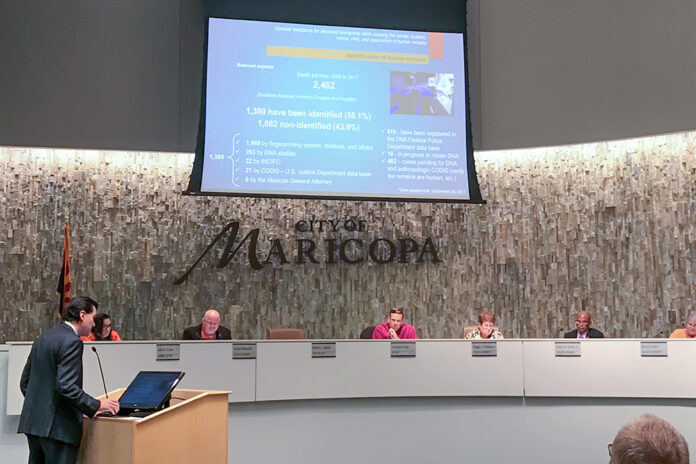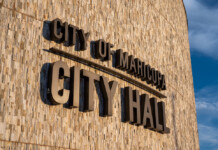
Representatives from the Mexican consulate appeared before the Maricopa City Council Tuesday, presenting information about the consulate and their role in the state and nation.
Answering an invitation by Councilmember Henry Wade, Deputy Consulate Enrique Gomez spoke on behalf of Consul Ricardo Pineda, highlighting statistics on Mexican nationals and immigrants in the United States and the programs offered to them and the community as a whole.
“Mexico has 50 consulates in the United States,” Gomez said. “It’s the largest consular network that one country has into another one.”
Five of those consulates are located in Arizona: Yuma, Nogales, Douglas, Tucson and Phoenix. The reason for having five, Gomez said, is because of three things: population, trade and immigration.
In Arizona, 27.3 percent of the population is of Hispanic origin. In Tucson that number is just over 40 percent of the population.
Mexico also trades more with Arizona than they do with all of Central America combined, Gomez said. Likewise, 40 percent of Arizona’s exports go to Mexico.
Because of this, the consulate offers numerous resources and programs for Mexicans abroad through legal assistance, and advice on labor, criminal, and administrative issues.
Other large programs are offered through the Institute for Mexicans Abroad – Instituto de los Mexicanos en el Exterior – or IME.
“[The IME] promotes strategies and programs to help Mexican communities living and working abroad to integrate and maintain contact with their countries of origin,” Gomez said.
The program offers education, community development and health and wellness advice and services.
The consulate, Gomez said, also works within the academic world, tracking advanced studies and networking with and connecting researchers all across the globe.
Locally, Gomez said, the consulate works with state and local governments and law enforcement agencies in both Pinal and Pima Counties, including Customs and Border Patrol and sheriffs offices in both counties.
Councilmember Julia Gusse asked Gomez if the consulate did much to work with undocumented immigrants who may be afraid to report crimes, given their status.
The consulate, Gomez said, understands their frustration and works with local law enforcement agencies so people may understand what their rights. He said he would be happy to work with the city of Maricopa to have the same discussion.
However, he said, “if there is ever any [criminal] issue, people should always collaborate with the authorities.”
In addition to these lesser-known services, he said, the consulate also provides typical passport and Matrícula services to Mexican nationals, and visa services to U.S. citizens looking to travel, study or work in Mexico.
For more information on Tucson’s Mexican Consulate and the services offered visit their website.


![Alleged car thief released without charges Phoenix police stop a stolen vehicle on April 20, 2024. [Facebook]](https://www.inmaricopa.com/wp-content/uploads/2024/04/IMG_5040-218x150.jpg)
![Locals find zen with Earth Day drum circle Lizz Fiedorczyk instructs a drum circle at Maricopa Community Center April 22, 2024. [Brian Petersheim Jr.]](https://www.inmaricopa.com/wp-content/uploads/2024/04/PJ_3922-Enhanced-NR-218x150.jpg)










![Alleged car thief released without charges Phoenix police stop a stolen vehicle on April 20, 2024. [Facebook]](https://www.inmaricopa.com/wp-content/uploads/2024/04/IMG_5040-100x70.jpg)
![Locals find zen with Earth Day drum circle Lizz Fiedorczyk instructs a drum circle at Maricopa Community Center April 22, 2024. [Brian Petersheim Jr.]](https://www.inmaricopa.com/wp-content/uploads/2024/04/PJ_3922-Enhanced-NR-100x70.jpg)
